Fuel Tank Truck Trailer is the lifeline of global fuel supply chains, enabling the safe, efficient transport of gasoline, diesel, biofuels, jet fuel, and other liquid hydrocarbons to industries, construction sites, farms, emergency services, and retail outlets. Without a reliable Fuel Tank Truck Trailer, businesses would struggle to maintain uninterrupted operations—farmers couldn’t refuel tractors in the field, construction crews would halt work due to equipment fuel shortages, and emergency responders might fail to deliver fuel to disaster-stricken areas. In 2025, as demand for cleaner fuels and smarter logistics grows, choosing the right Fuel Tank Truck Trailer isn’t just a purchase—it’s a strategic investment that impacts your bottom line, regulatory compliance, and operational resilience.
This guide dives deep into every critical aspect of Fuel Tank Truck Trailer: from understanding different types and their applications to decoding specifications like dimensions and materials, calculating the perfect capacity for your needs, and navigating the market to find the best Fuel Tank Truck Trailer for sale. Whether you’re a small-scale farmer needing a compact 100 Gallon Fuel Tank Truck Trailer or a large distributor requiring a heavy-duty 45000 Litres Fuel Tank Truck Trailer, we’ll equip you with the knowledge to make an informed decision—and connect you with solutions that align with your business goals.
Key Types of Fuel Tank Truck Trailer: Which One Fits Your Operations?
Not all Fuel Tank Truck Trailers are created equal. Each type is engineered to address specific transportation challenges, fuel types, and industry needs. Understanding these variations is the first step to selecting a Fuel Tank Truck Trailer that maximizes efficiency and minimizes risk. Below are the most common types of Fuel Tank Truck Trailer, along with their use cases, advantages, and ideal applications.
Single-Compartment Fuel Tank Truck Trailer
The single-compartment Fuel Tank Truck Trailer is the simplest and most widely used design, featuring a single, seamless tank for transporting one type of fuel. This model is ideal for businesses that focus on a single fuel type—such as a diesel distributor supplying construction sites or a gasoline retailer restocking local stations.
- Advantages:
- Fewer internal components (no dividers), reducing maintenance needs and leak risks.
- Maximum usable capacity (no space wasted on compartment walls).
- Lower upfront cost compared to multi-compartment models.
- Ideal Applications:
- Small to medium-sized fuel retailers.
- Construction companies transporting diesel for excavators and trucks.
- Agricultural operations using a 100 Gallon Fuel Tank Truck Trailer to refuel tractors and harvesters.
- Popular Sizes: 100 Gallon, 500 Gallon, 2000 Litres, 10000 Litres.
Multi-Compartment Fuel Tank Truck Trailer
For businesses that need to transport multiple fuel types (e.g., gasoline, diesel, and biofuel) in one trip, the multi-compartment Fuel Tank Truck Trailer is the perfect solution. This model features internal dividers (called “bulkheads”) that separate the tank into 2–6 compartments, each with its own filling, venting, and dispensing systems—eliminating cross-contamination risks.
- Advantages:
- Reduces transportation costs by combining multiple fuel deliveries into one trip.
- Eliminates the need for multiple Fuel Tank Truck Trailers, saving storage and maintenance space.
- Flexible for serving diverse clients (e.g., a single trailer can supply a farm with diesel and a nearby gas station with gasoline).
- Ideal Applications:
- Large fuel distributors serving multiple clients.
- Mining operations that use both diesel (for heavy machinery) and gasoline (for light vehicles).
- Emergency services that need to transport fuel and lubricants to disaster zones.
- Popular Sizes: 20000 Litres (3–4 compartments), 30000 Litres (4–5 compartments), 45000 Litres (5–6 compartments). The 45000 Litres Fuel Tank Truck Trailer with multi-compartment design is especially popular among national distributors due to its bulk transport capabilities.
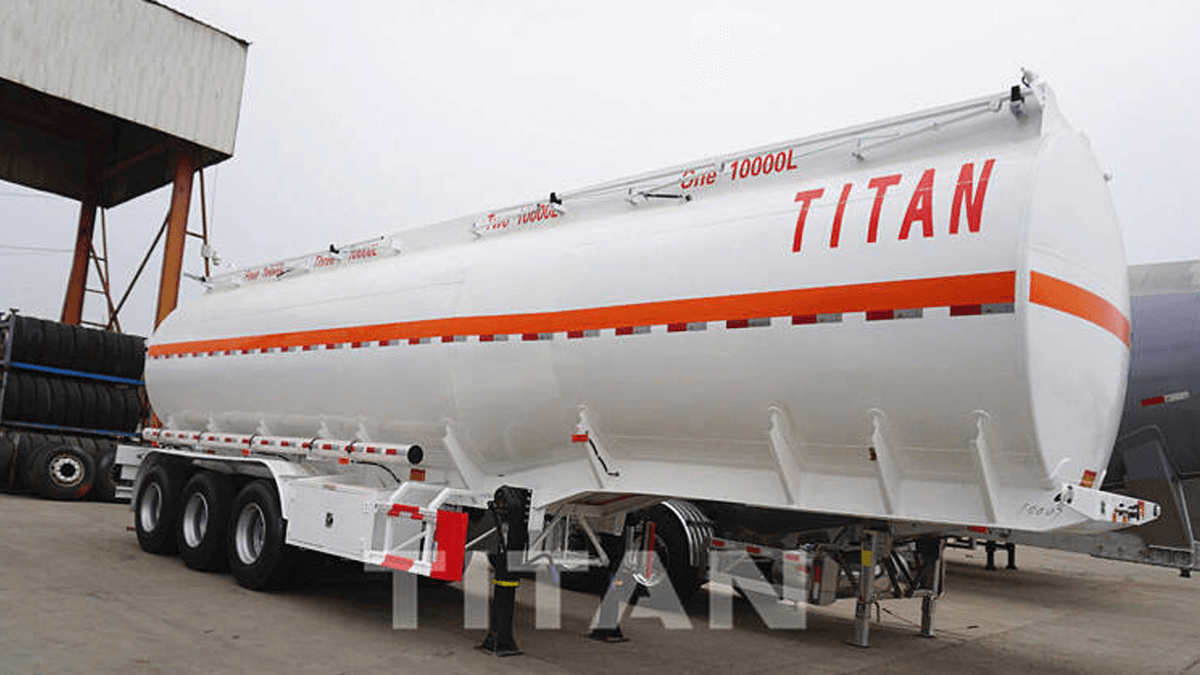
Insulated Fuel Tank Truck Trailer
Temperature-sensitive fuels (e.g., jet fuel, biodiesel, or heavy fuel oil) require an insulated Fuel Tank Truck Trailer to maintain a consistent temperature during transport. This model features a layer of insulation (usually foam or fiberglass) between the tank’s inner and outer shells, preventing heat gain or loss that could alter the fuel’s viscosity or quality.
- Advantages:
- Protects fuel quality in extreme weather (e.g., preventing biodiesel from freezing in winter or jet fuel from overheating in summer).
- Reduces the need for post-transport fuel treatment.
- Complies with strict industry standards for temperature-sensitive liquid transport.
- Ideal Applications:
- Aviation fuel distributors supplying airports.
- Biotech companies transporting biofuels that degrade at extreme temperatures.
- Cold-climate regions where diesel may gel without insulation.
- Popular Sizes: 15000 Litres, 30000 Litres, 45000 Litres (for long-haul jet fuel transport).
Heated Fuel Tank Truck Trailer
For fuels that solidify or thicken at low temperatures (e.g., heavy fuel oil, crude oil, or some biodiesels), the heated Fuel Tank Truck Trailer is essential. This model adds a heating system (either electric, hydraulic, or fuel-fired) to the insulated tank, ensuring the fuel remains fluid and pumpable even in sub-zero conditions.
- Advantages:
- Enables year-round transport of heavy fuels in cold regions (e.g., Canada, Northern Europe).
- Prevents costly delays caused by fuel gelling or solidification.
- Works with insulation to maximize temperature control.
- Ideal Applications:
- Oil refineries transporting crude oil to processing plants in winter.
- Maritime ports supplying heavy fuel oil to ships in cold climates.
- Industrial facilities using viscous fuels for generators or boilers.
- Popular Sizes: 25000 Litres, 45000 Litres (for bulk crude oil transport).
Portable Fuel Tank Truck Trailer
The portable Fuel Tank Truck Trailer (often referred to as a “tow-behind” model) is a compact, lightweight option designed for on-site fueling. Unlike full-size semi-trailers, these models are towed by pickup trucks or small commercial vehicles, making them ideal for businesses that need to refuel equipment in remote locations.
- Advantages:
- High maneuverability in tight spaces (e.g., farm fields, construction sites).
- No need for a commercial driver’s license (CDL) in many regions (for small sizes like 100 Gallon).
- Low maintenance and storage costs.
- Ideal Applications:
- Small farms using a 100 Gallon Fuel Tank Truck Trailer to refuel ATVs and small tractors.
- Landscaping companies fueling mowers and generators on-site.
- Event organizers supplying fuel for backup generators at outdoor venues.
- Popular Sizes: 100 Gallon, 200 Gallon, 500 Litres.
Comprehensive Fuel Tank Truck Trailer Specifications: Dimensions, Materials, and Safety Features
The performance, safety, and compliance of a Fuel Tank Truck Trailer depend entirely on its specifications. From dimensions that dictate road legality to materials that impact durability, every detail matters. Below is a breakdown of the most critical Fuel Tank Truck Trailer specifications, with insights into how they affect your operations.
Fuel Tank Truck Trailer Dimensions: Balancing Capacity and Maneuverability
Dimensions are non-negotiable—they determine whether your Fuel Tank Truck Trailer can navigate roads, fit in storage facilities, and comply with local transportation regulations. Most countries (e.g., the U.S., EU, China) have strict limits on trailer length, width, and height to ensure road safety. Here’s a breakdown of standard dimensions for popular Fuel Tank Truck Trailer models:
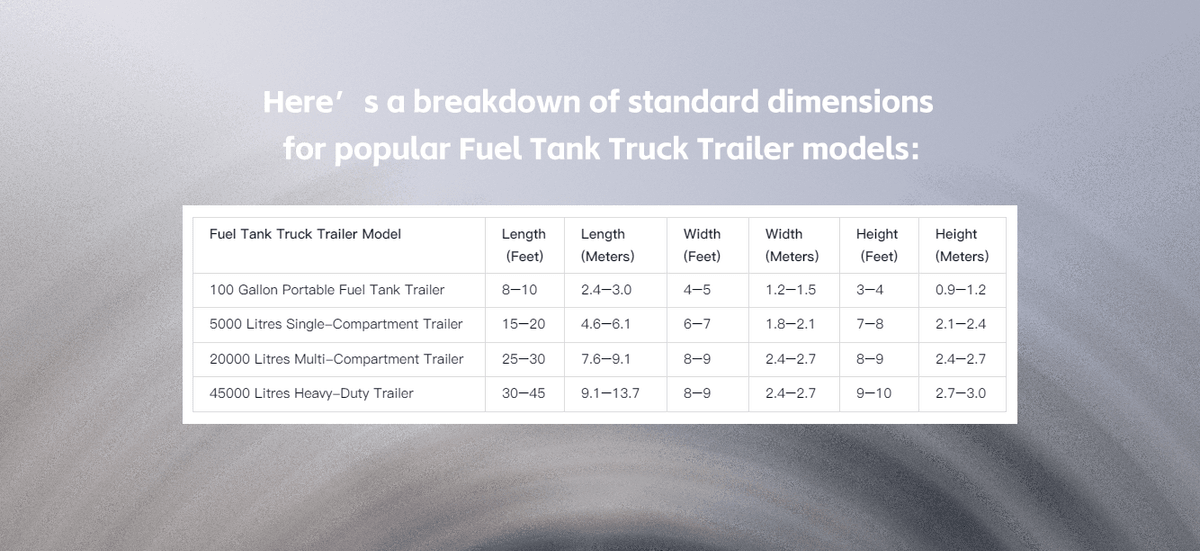
- Key Considerations:
- Length: Longer Fuel Tank Truck Trailers (e.g., 45-foot 45000 Litres models) are ideal for long-haul, highway transport but may struggle in urban areas or narrow roads. Shorter models (e.g., 10-foot 100 Gallon trailers) are better for tight spaces.
- Width: Most regions cap trailer width at 8.5 feet (2.6 meters) to fit standard lanes. Exceeding this requires special permits, which can delay deliveries.
- Height: Taller Fuel Tank Truck Trailers (over 10 feet) may face restrictions on bridges, tunnels, or low-hanging power lines. Always check local height limits before purchasing.
Fuel Tank Truck Trailer Materials: Steel vs. Aluminum vs. Composite
The material of your Fuel Tank Truck Trailer’s tank directly impacts its weight, durability, corrosion resistance, and maintenance costs. The two most common materials are steel and aluminum, with composite materials (e.g., fiberglass) used for specialized applications.
Steel Fuel Tank Truck Trailer
Steel is a traditional choice for Fuel Tank Truck Trailers, valued for its strength and affordability. It’s available in two variants: carbon steel (for non-corrosive fuels like diesel) and stainless steel (for corrosive fuels like gasoline or biofuels).
- Advantages:
- Exceptional strength: Withstands impacts, heavy loads, and rough terrain—ideal for heavy-duty 45000 Litres Fuel Tank Truck Trailers used in mining or construction.
- Low upfront cost: Steel trailers are 15–25% cheaper than aluminum models of the same size.
- Easy to repair: Steel can be welded on-site, reducing downtime if damage occurs.
- Disadvantages:
- Heavy weight: Steel adds 20–30% more weight to the trailer than aluminum, reducing payload capacity (e.g., a 45000 Litres steel trailer may carry 5–10% less fuel than an aluminum version).
- Corrosion risk: Carbon steel rusts if exposed to moisture or corrosive fuels—requires regular painting or coating.
- Ideal Applications:
- Short-haul transport of diesel or heavy fuel oil.
- Environments with rough terrain (e.g., mines, construction sites).
- Businesses on a tight budget prioritizing upfront cost over long-term efficiency.
Aluminum Fuel Tank Truck Trailer
Aluminum is the preferred material for modern Fuel Tank Truck Trailers, especially for long-haul and high-capacity models. It’s lightweight, corrosion-resistant, and offers superior payload efficiency.
- Advantages:
- Lightweight: Aluminum is 30% lighter than steel, meaning an aluminum 45000 Litres Fuel Tank Truck Trailer can carry more fuel per trip (increasing revenue) and reduce fuel consumption for the towing vehicle (lowering operational costs).
- Corrosion-resistant: Aluminum doesn’t rust, even when exposed to gasoline, biofuels, or saltwater (ideal for coastal regions).
- Longer lifespan: Aluminum trailers last 15–20 years (vs. 10–15 years for steel) with minimal maintenance.
- Disadvantages:
- Higher upfront cost: Aluminum trailers cost 20–30% more than steel models, though this is often offset by fuel savings and lower maintenance over time.
- Less impact-resistant: Aluminum can dent more easily than steel—requires careful handling in rough terrain.
- Ideal Applications:
- Long-haul transport of gasoline, biofuels, or jet fuel.
- Large distributors using 45000 Litres Fuel Tank Truck Trailers for cross-country deliveries.
- Coastal regions or areas with high humidity (to avoid corrosion).
3.2.3 Composite Fuel Tank Truck Trailer
Composite materials (e.g., fiberglass-reinforced plastic, or FRP) are used for specialized Fuel Tank Truck Trailers transporting highly corrosive liquids (e.g., chemicals, ethanol) or for applications where weight is critical (e.g., aerospace fuel transport).
- Advantages:
- Extreme corrosion resistance: Impervious to even the most aggressive fuels or chemicals.
- Ultra-lightweight: Lighter than aluminum, further increasing payload capacity.
- Disadvantages:
- Very high cost: Composite trailers can cost 2–3 times more than aluminum models.
- Limited availability: Few manufacturers (including Haisen) offer composite Fuel Tank Truck Trailers, and customization options are limited.
- Ideal Applications:
- Chemical companies transporting corrosive liquids.
- Aerospace industry supplying specialized jet fuels.
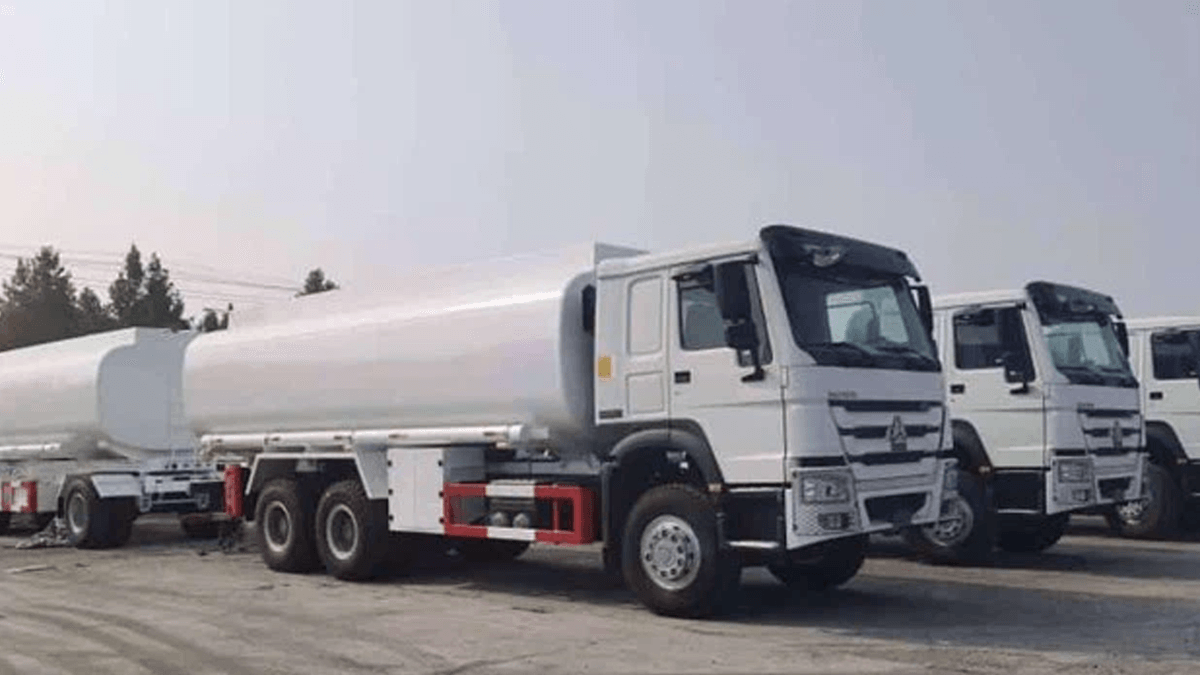
Fuel Tank Truck Trailer Capacity: From 100 Gallon to 45000 Litres—Choosing the Right Size
Capacity is the most critical factor when selecting a Fuel Tank Truck Trailer. It directly impacts how much fuel you can transport per trip, how many trips you need to make (and thus operational costs), and whether you can meet your clients’ demand. Choosing a capacity that’s too small leads to wasted time and fuel; choosing one that’s too large results in unnecessary upfront costs and regulatory headaches. Below is a detailed breakdown of popular Fuel Tank Truck Trailer capacities, their applications, and how to calculate the right size for your business.
100 Gallon Fuel Tank Truck Trailer: Compact Power for Small-Scale Needs
The 100 Gallon Fuel Tank Truck Trailer is the smallest standard model, designed for light-duty, on-site fueling. It’s typically a portable, tow-behind trailer that can be hitched to a pickup truck or small SUV—no CDL required in most regions.
- Key Specifications:
- Capacity: 100 Gallons (≈378.5 Litres)
- Weight (Empty): 300–500 Pounds (≈136–227 kg)
- Weight (Full): 1,100–1,300 Pounds (≈499–589 kg)
- Materials: Steel (budget option) or aluminum (lightweight option)
- Features: Manual or electric pump, spill containment, basic pressure relief valve.
- Ideal Applications:
- Small Farms: Refueling ATVs, small tractors, and irrigation pumps in remote fields. A 100 Gallon Fuel Tank Truck Trailer eliminates the need to transport equipment to a gas station, saving time and labor.
- Landscaping Companies: Fueling mowers, leaf blowers, and generators at job sites. The compact size fits through narrow gates and tight spaces.
- Event Organizers: Supplying backup generators for outdoor weddings, concerts, or festivals. The portable design allows easy setup in parking lots or fields.
- Personal Use: Fueling boats, RVs, or off-road vehicles at remote campsites or marinas.
- Cost Analysis:
- New 100 Gallon Fuel Tank Truck Trailer: $2,500–$5,000 (steel models at the lower end, aluminum at the higher end).
- Used 100 Gallon Fuel Tank Truck Trailer: $1,500–$3,000 (depending on age and condition).
- Maintenance Costs: $100–$300 per year (mostly for pump maintenance and steel coating).
- Why Choose This Size: If your fuel needs are less than 500 gallons per week and you require mobility, the 100 Gallon Fuel Tank Truck Trailer is the most cost-effective option. It’s easy to store, requires minimal maintenance, and avoids the regulatory hurdles of larger trailers.
5,000–20,000 Litres Fuel Tank Truck Trailer: Medium-Capacity for Regional Operations
Medium-capacity Fuel Tank Truck Trailers (5,000–20,000 Litres, or ≈1,320–5,280 Gallons) are designed for regional distributors and mid-sized businesses that need to transport fuel between cities or towns. They’re typically semi-trailers towed by commercial trucks, requiring a CDL in most regions.
- Key Specifications (10,000 Litres Model as Example):
- Capacity: 10,000 Litres (≈2,640 Gallons)
- Weight (Empty): 3,000–4,500 kg (≈6,614–9,921 Pounds)
- Weight (Full): 11,000–12,500 kg (≈24,251–27,558 Pounds)
- Materials: Aluminum (most common) or steel (for heavy-duty use)
- Features: Multi-compartment options (2–3), electric pumps, GPS tracking, advanced safety valves.
- Ideal Applications:
- Regional Fuel Distributors: Supplying small gas stations, convenience stores, or rural communities within a 100–200 mile radius. A 10,000 Litres Fuel Tank Truck Trailer can make 2–3 deliveries per day, reducing transport costs.
- Construction Companies: Fueling large fleets of excavators, bulldozers, and trucks at major construction sites (e.g., highways, commercial buildings). A 20,000 Litres model can supply a site for 3–5 days, minimizing downtime.
- Municipalities: Delivering fuel to fire stations, police departments, and public works vehicles. The multi-compartment design allows transporting both diesel (for trucks) and gasoline (for cars) in one trip.
- Cost Analysis:
- New 10,000 Litres Fuel Tank Truck Trailer: $12,000–$20,000 (aluminum, multi-compartment).
- New 20,000 Litres Fuel Tank Truck Trailer: $18,000–$28,000 (aluminum, 3–4 compartments).
- Used 10,000 Litres Fuel Tank Truck Trailer: $8,000–$15,000 (5–10 years old, well-maintained).
- Maintenance Costs: $500–$1,000 per year (includes pump servicing, valve inspections, and aluminum cleaning).
- Why Choose This Size: If your business transports 5,000–20,000 litres of fuel per week and operates within a regional area, a medium-capacity Fuel Tank Truck Trailer balances efficiency and cost. It’s large enough to reduce delivery trips but small enough to navigate urban roads and small job sites.
45,000 Litres Fuel Tank Truck Trailer: Heavy-Duty for Bulk, Long-Haul Transport
The 45,000 Litres Fuel Tank Truck Trailer is the gold standard for large-scale distributors, refineries, and national logistics companies. It’s a full-size semi-trailer designed for long-haul transport of bulk fuels (e.g., gasoline, diesel, jet fuel) across states or countries.
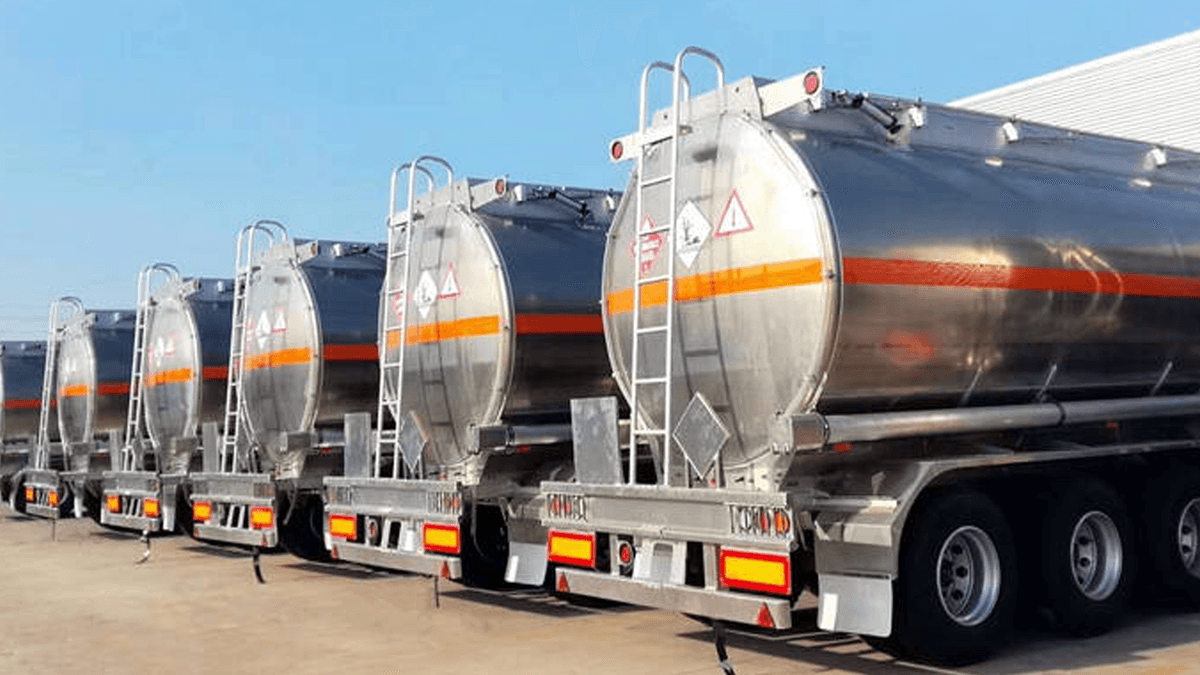
- Key Specifications:
- Capacity: 45,000 Litres (≈11,888 Gallons)
- Weight (Empty): 6,000–8,000 kg (≈13,228–17,637 Pounds)
- Weight (Full): 45,000–50,000 kg (≈99,208–110,231 Pounds)
- Materials: High-strength aluminum (standard) or stainless steel (for corrosive fuels)
- Features: 5–6 compartments, advanced anti-surge baffles, GPS-enabled tracking, automatic pressure control, full spill containment, and 24/7 remote monitoring.
- Ideal Applications:
- National Fuel Distributors: Supplying large gas station chains (e.g., Shell, BP) or industrial facilities (e.g., power plants, manufacturing plants) across the country. A 45,000 Litres Fuel Tank Truck Trailer can transport enough fuel to supply a large gas station for 1–2 weeks.
- Refineries: Transporting crude oil to processing plants or finished fuels to distribution hubs. The multi-compartment design allows separating different fuel grades (e.g., regular, premium gasoline).
- Aviation Fuel Suppliers: Delivering jet fuel to major airports. Haisen’s 45,000 Litres Fuel Tank Truck Trailer for aviation includes specialized insulation and filtration systems to meet strict aviation standards.
- Cost Analysis:
- New 45,000 Litres Fuel Tank Truck Trailer (Aluminum): $20,000–$50,000 (depending on customization—e.g., insulation, tracking systems).
- New 45,000 Litres Fuel Tank Truck Trailer (Stainless Steel): $35,000–$65,000 (for corrosive fuels like ethanol).
- Used 45,000 Litres Fuel Tank Truck Trailer: $15,000–$30,000 (5–15 years old, with maintenance records).
- Maintenance Costs: $1,500–$3,000 per year (includes professional inspections, pump overhauls, and software updates for tracking systems).
- Regulatory Considerations:
- Weight Limits: A full 45,000 Litres Fuel Tank Truck Trailer exceeds the legal weight limit in many regions (e.g., the U.S. limits semi-trailer weight to 80,000 Pounds, or ≈36,287 kg). This requires special overweight permits, which can take 1–2 weeks to obtain.
- Driver Requirements: Operators must have a Class A CDL (U.S.) or equivalent (EU: C+E license) with a hazardous materials (hazmat) endorsement.
- Route Restrictions: Many states and countries restrict 45,000 Litres Fuel Tank Truck Trailers from traveling on narrow roads, bridges, or during peak hours.
- Why Choose This Size: If your business transports 50,000+ litres of fuel per week and operates long-haul routes, the 45,000 Litres Fuel Tank Truck Trailer is the most efficient option. It reduces the number of trips by 50–75% compared to medium-capacity models, drastically lowering fuel and labor costs.
How to Calculate Your Ideal Fuel Tank Truck Trailer Capacity
Choosing the right capacity isn’t guesswork—it’s a calculation based on your fuel demand, transport distance, and operational constraints. Follow these steps to determine your ideal Fuel Tank Truck Trailer capacity:
Calculate Your Weekly Fuel Demand:
- Add up the total fuel your business or clients use per week. For example: A regional distributor supplies 10 gas stations, each using 2,000 litres per week = 20,000 litres/week.
Determine Your Maximum Transport Distance:
- Calculate the round-trip distance from your storage facility to your farthest client. For example: 200 miles round-trip.
Estimate Your Weekly Delivery Trips:
- Decide how many trips you can realistically make per week (considering driver hours, road conditions, and loading/unloading time). For example: 5 trips/week.
Calculate Required Capacity per Trip:
- Divide your weekly demand by the number of trips: 20,000 litres / 5 trips = 4,000 litres per trip.
- Add a 10–15% buffer for unexpected demand: 4,000 litres × 1.15 = 4,600 litres.
Select the Nearest Standard Capacity:
- The nearest standard capacity to 4,600 litres is 5,000 litres. Thus, a 5,000 Litres Fuel Tank Truck Trailer is ideal.
- Pro Tip: If your demand varies seasonally (e.g., farms use more fuel in harvest season), choose a capacity that meets your peak demand. A 10,000 Litres Fuel Tank Truck Trailer can handle both regular (5,000 litres/week) and peak (8,000 litres/week) demand without extra trips.
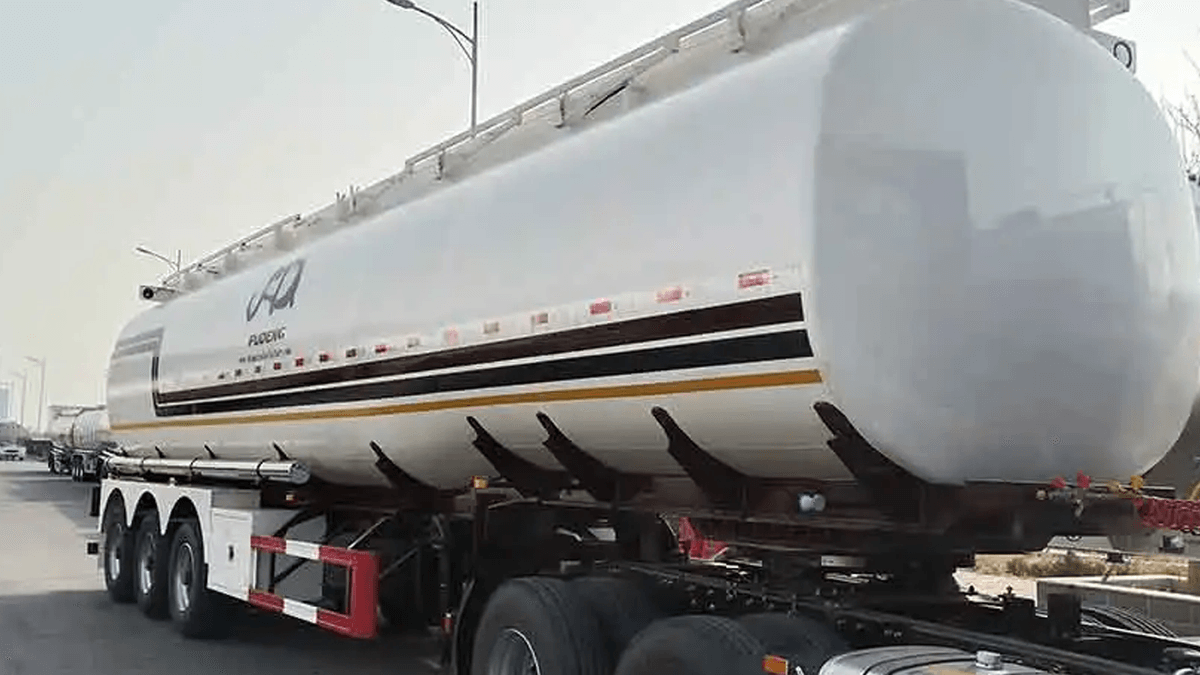
How to Choose the Perfect Fuel Tank Truck Trailer for Your Business: Step-by-Step Guide
Choosing the right Fuel Tank Truck Trailer is a decision that impacts your operations for years to come. With so many options—from 100 Gallon portable models to 45,000 Litres heavy-duty trailers—it’s easy to feel overwhelmed. This step-by-step guide will help you narrow down your choices and select a Fuel Tank Truck Trailer that meets your needs, budget, and regulatory requirements.
Step 1: Define Your Fuel Transportation Needs
Before you start shopping, clearly define what you need your Fuel Tank Truck Trailer to do. Answer these questions to avoid buying a trailer that’s too big, too small, or ill-equipped for your operations:
What Type of Fuel Will You Transport?
- Gasoline, diesel, biofuel, jet fuel, or something else? Corrosive fuels (e.g., gasoline, ethanol) require aluminum or stainless steel tanks to prevent rust and contamination; non-corrosive fuels (e.g., diesel, heavy fuel oil) can use more affordable steel tanks.
- Is the fuel temperature-sensitive? (e.g., jet fuel that degrades in heat, biodiesel that freezes in cold) If yes, an insulated or heated Fuel Tank Truck Trailer is non-negotiable. For example, a biodiesel distributor in Minnesota would need a heated 10,000 Litres Fuel Tank Truck Trailer to operate in winter.
How Much Fuel Do You Need to Transport Per Trip?
- Calculate your average single-load requirement by reviewing past delivery records or client orders. For a small farm that uses 50 gallons of diesel per week, a 100 Gallon Fuel Tank Truck Trailer is sufficient (allowing 2 trips per week). For a distributor supplying 50,000 litres of gasoline to gas stations monthly, a 45,000 Litres Fuel Tank Truck Trailer can handle the load in one weekly trip.
What Is the Maximum Transport Distance?
- Short-haul (under 100 miles): Prioritize maneuverability—e.g., a 5,000 Litres Fuel Tank Truck Trailer that fits in urban areas or small job sites.
- Long-haul (over 200 miles): Prioritize capacity and efficiency—e.g., a 45,000 Litres Fuel Tank Truck Trailer with air ride suspension (reduces fuel sloshing) and GPS tracking (monitors location and fuel levels).
How Often Will You Use the Trailer?
- Daily use: Invest in a durable aluminum Fuel Tank Truck Trailer with low maintenance needs (e.g., 20,000 Litres model with corrosion resistance).
- Weekly/monthly use: A steel 100 Gallon or 5,000 Litres Fuel Tank Truck Trailer may be more cost-effective, as lower usage means less wear on the tank.
Will You Transport Multiple Fuels at Once?
- If yes, a multi-compartment Fuel Tank Truck Trailer is essential. For example, a construction supplier transporting diesel (for excavators) and gasoline (for pickup trucks) would need a 10,000 Litres Fuel Tank Truck Trailer with 2 compartments (7,000 litres for diesel, 3,000 litres for gasoline).
Step 2: Understand Regulatory Compliance Requirements
Every region has strict rules for Fuel Tank Truck Trailers—ignoring these can lead to fines, seized equipment, or legal liability. Research the following regulations before making a purchase:
Weight and Dimension Limits
- U.S./Canada: Maximum gross vehicle weight (GVW) for a semi-trailer is 80,000 pounds (≈36,287 kg). A full 45,000 Litres Fuel Tank Truck Trailer weighs ~45,000 kg, so you’ll need an overweight permit (process takes 1–2 weeks) to operate it legally.
- EU: Maximum GVW is 40,000 kg for most countries. A 45,000 Litres Fuel Tank Truck Trailer may require a special permit for cross-border transport.
- Width/height: Most regions cap trailer width at 8.5 feet (2.6 meters) and height at 13.5 feet (4.1 meters). Ensure your Fuel Tank Truck Trailer fits these limits to avoid bridge/tunnel restrictions.
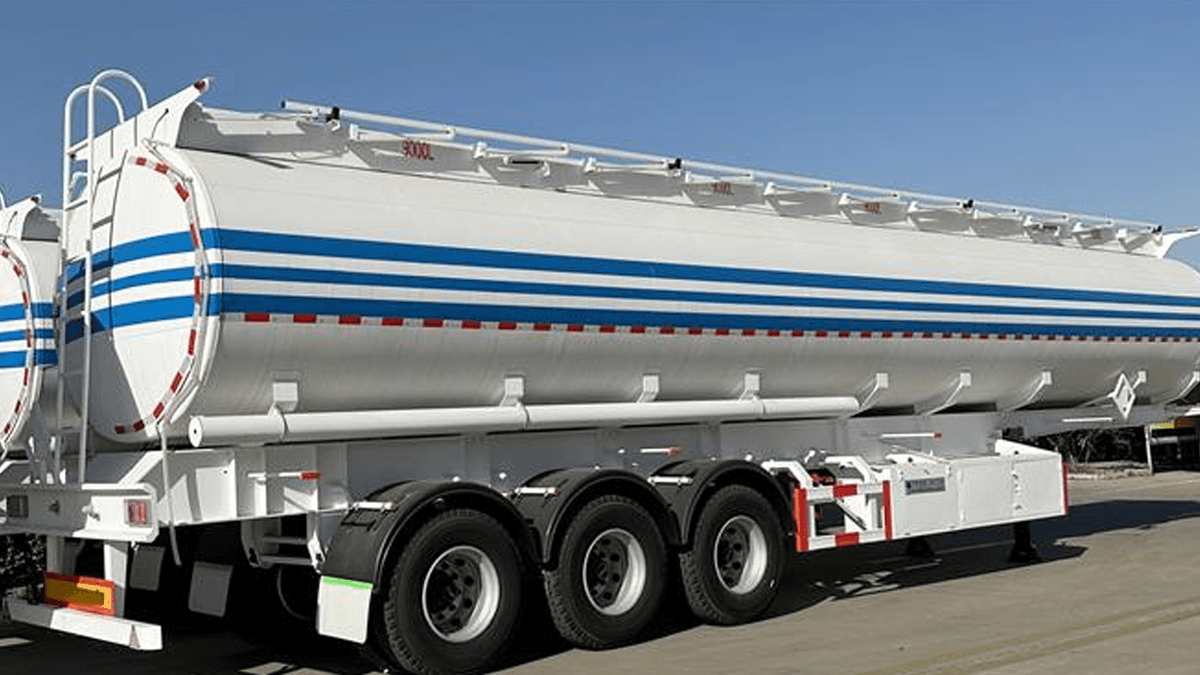
Safety Certifications
- Mandatory certifications vary by region:
- U.S./Canada: DOT (Department of Transportation) certification for hazardous materials transport.
- EU: ADR (Agreement Concerning the International Carriage of Dangerous Goods by Road) certification.
- Global: ISO 3874 (standard for road transport of dangerous goods).
- Verify that any Fuel Tank Truck Trailer for sale has these certifications—uncertified trailers are illegal to use for fuel transport.
Driver Qualifications
- Operators of large Fuel Tank Truck Trailers (e.g., 20,000+ Litres) need a commercial driver’s license (CDL) with a hazardous materials (hazmat) endorsement. For small models like the 100 Gallon Fuel Tank Truck Trailer, a regular driver’s license may suffice (check local rules).
- Factor in driver training costs if your team doesn’t have the required qualifications—this is part of your total investment in the Fuel Tank Truck Trailer.
Step 3: Calculate Your Ideal Capacity (With Real-World Examples)
Capacity is the most impactful factor for efficiency—too small, and you’ll make extra trips; too large, and you’ll waste money on unused space. Use this formula to calculate your ideal Fuel Tank Truck Trailer capacity:
Ideal Capacity = (Weekly Fuel Demand ÷ Weekly Trips) × 1.15 (15% buffer for unexpected demand)
Example 1: Small Farm
- Weekly diesel demand: 150 gallons
- Weekly trips possible: 2 (farmer can only tow the trailer twice a week)
- Ideal Capacity = (150 ÷ 2) × 1.15 = 86.25 gallons → Choose a 100 Gallon Fuel Tank Truck Trailer (closest standard size).
Example 2: Regional Fuel Distributor
- Weekly gasoline demand: 35,000 litres
- Weekly trips possible: 1 (driver works 5 days/week, 1 long trip per week)
- Ideal Capacity = (35,000 ÷ 1) × 1.15 = 40,250 litres → Choose a 45,000 Litres Fuel Tank Truck Trailer (handles peak demand and reduces the need for extra trips).
Example 3: Construction Company
- Weekly diesel demand: 8,000 litres
- Weekly trips possible: 3 (driver can make 3 short trips to the job site)
- Ideal Capacity = (8,000 ÷ 3) × 1.15 ≈ 3,067 litres → Choose a 5,000 Litres Fuel Tank Truck Trailer (flexible for busy weeks and avoids overloading).
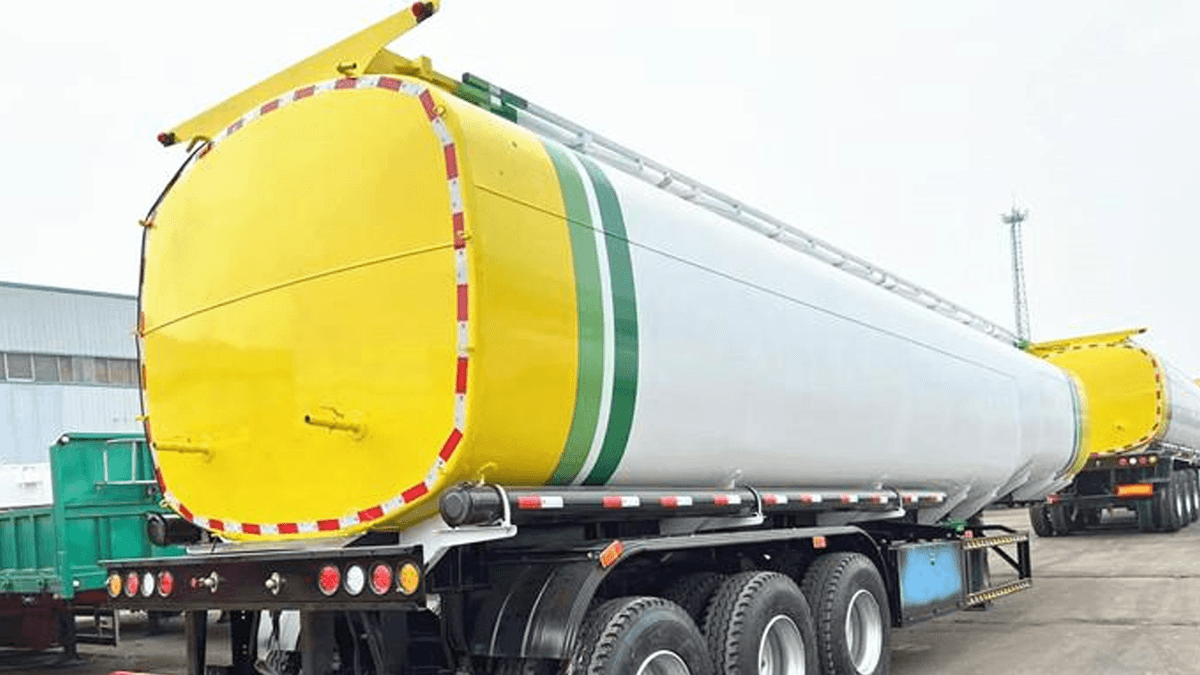
Why Choose Haisen for Your Fuel Tank Truck Trailer?
When you invest in a Fuel Tank Truck Trailer, you need a partner that delivers quality, customization, and support—Haisen checks all these boxes. Here’s why 10,000+ businesses worldwide choose Haisen’s Fuel Tank Truck Trailers:
Industry-Leading Quality and Compliance
- Certified to Global Standards: All Haisen Fuel Tank Truck Trailers meet DOT, ISO, ADR, and EPA regulations—no matter where you operate.
- Rigorous Testing: Every trailer undergoes 12 quality checks (pressure testing, load testing, leak testing) before delivery. Haisen’s 45,000 Litres Fuel Tank Truck Trailer, for example, is tested to withstand 120% of its maximum load for 100 miles.
- Durable Materials: Haisen uses high-strength aluminum (6061-T6 grade) and stainless steel (304/316 grade) for tanks—ensuring a lifespan of 15–20 years (5 years longer than industry averages).
Fully Customizable Solutions
No two businesses are the same—Haisen designs Fuel Tank Truck Trailers to fit your exact needs:
- Capacity Options: From 100 Gallon portable models to 45,000 Litres heavy-duty trailers.
- Custom Features: Insulation, heating systems, multi-compartments, GPS tracking, electric pumps—add what you need, skip what you don’t.
- Fast Turnaround: Custom Fuel Tank Truck Trailers take 4–6 weeks to manufacture (2 weeks faster than competitors).
Competitive Pricing and Value
- Direct Manufacturer Pricing: No middleman markup—Haisen’s Fuel Tank Truck Trailers are 10–20% cheaper than dealerships. For example, a 45,000 Litres aluminum Fuel Tank Truck Trailer costs $33,000–$50,000 at Haisen vs. $40,000–$60,000 at a dealer.
- Low Maintenance Costs: Aluminum tanks require 50% less maintenance than steel—save $2,000–$5,000 over 10 years.
- Fuel Savings: Lightweight aluminum trailers reduce the towing vehicle’s fuel consumption by 10–15%—adds up to $10,000+ in savings annually for long-haul users.
Exceptional After-Sales Support
- Warranty Coverage: 5-year warranty on aluminum tanks, 3-year warranty on steel tanks, and 1-year warranty on parts (pumps, valves, GPS).
- Global Maintenance Network: Haisen has 50+ service centers worldwide—get repairs or maintenance no matter where you are.
- 24/7 Support: A team of engineers is available 24/7 to help with troubleshooting (e.g., “My 100 Gallon Fuel Tank Truck Trailer’s pump isn’t working—what do I do?”).
Sustainability Commitment
Haisen is dedicated to reducing the environmental impact of Fuel Tank Truck Trailers:
- Eco-Friendly Materials: 90% of components are recyclable.
- Electric Auxiliary Systems: Reduce carbon emissions by 20% compared to diesel-powered systems.
- Fuel Efficiency: Lightweight designs lower the towing vehicle’s carbon footprint—helping you meet sustainability goals.
Get Your Custom Fuel Tank Truck Trailer Quote Today
Ready to invest in a Fuel Tank Truck Trailer that boosts efficiency, ensures safety, and fits your budget? Contact Haisen today for a free, no-obligation quote:

Whether you need a 100 Gallon Fuel Tank Truck Trailer for your farm or a 45,000 Litres model for your distribution business, Haisen has you covered. Join thousands of satisfied customers who trust Haisen for their Fuel Tank Truck Trailer needs—your reliable partner in fuel transport.
